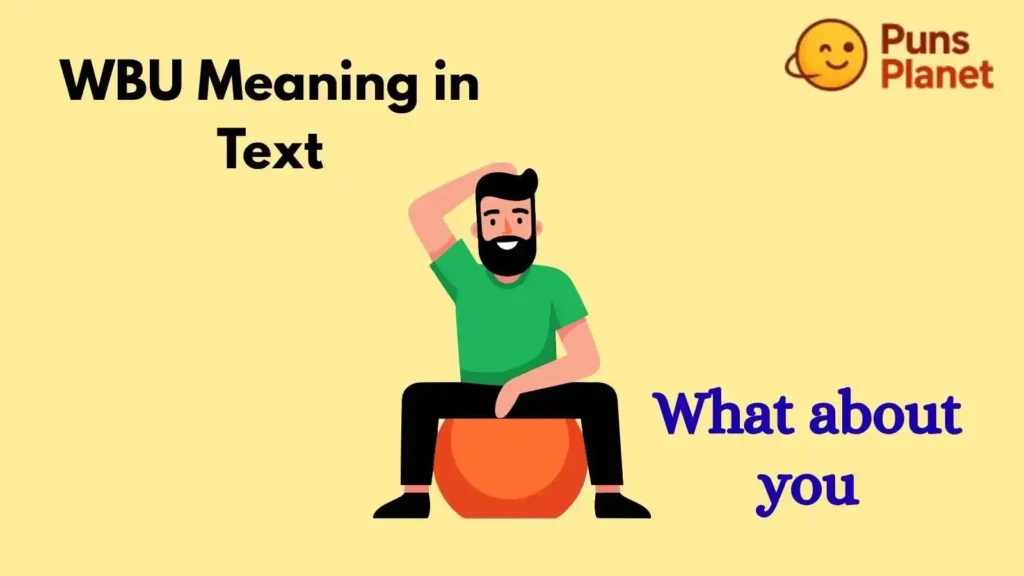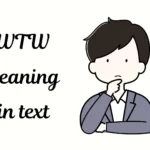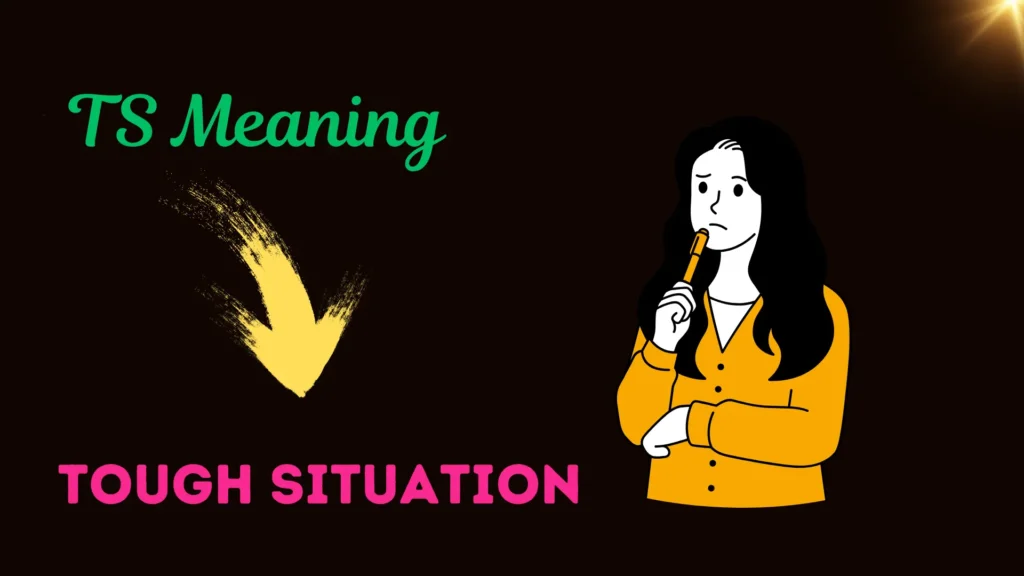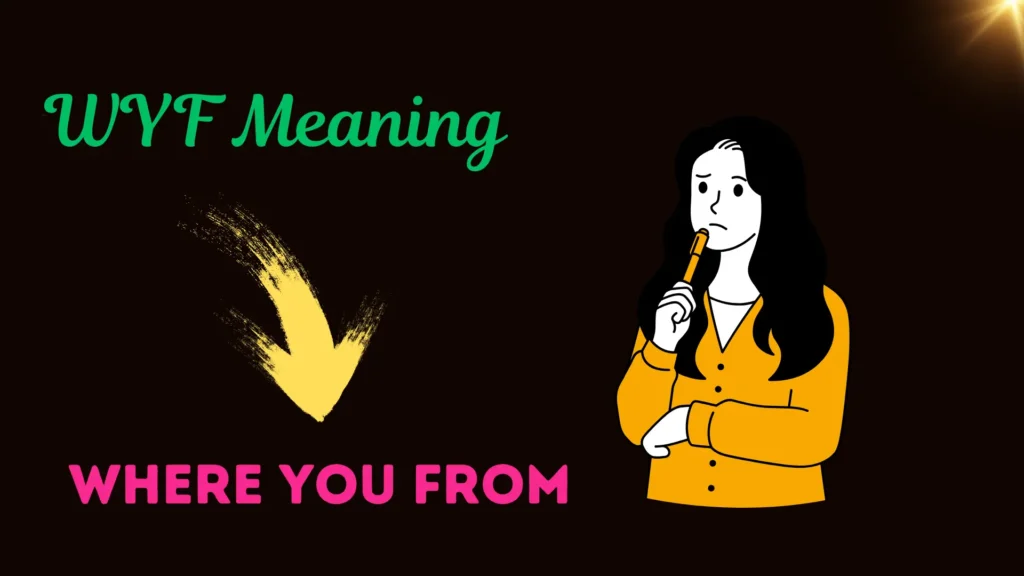Have you ever seen someone type “WBU?” in a chat and paused, wondering what it really meant? You’re not alone. In today’s fast‑moving digital conversations, acronyms fly by like lightning bolts and it’s easy to feel out of the loop.
But don’t worry—I’m here to walk you through the meaning of “WBU” in text, how to use it correctly, when to avoid it, and why it matters. 🎉
From casual chats to social media posts, this simple three‑letter acronym packs a lot of meaning and can help you connect more smoothly with others.
By the end of this article you’ll not only understand what “WBU” stands for, but you’ll be able to use it confidently—and with style.
1. What Does “WBU” Stand For?
The acronym WBU most commonly stands for “What about you?”, used in texting, instant messaging, and online chats.
In essence, after you share your own thought or situation, using “WBU?” invites the other person to respond. It’s a friendly, casual way to turn the spotlight to them.
For example:
- You: “I’m going to watch a movie tonight. WBU?”
- Friend: “I’m staying in and reading a book.”
2. Why “WBU” and Not Something Else? 🤔
It’s worth asking: why “WBU” and not “WAU” or some other variation? The answer lies in how texting slang evolves.
Here’s the breakdown:
- The full phrase: “What about you?”
- Somewhat shortened, “What ’bout you?”
- Then further shortened as an acronym: WBU.
So while it may not be a “perfect” acronym letter‑by‑letter, it’s the one that stuck and became popular.
3. Where Is “WBU” Commonly Used?
Knowing the right context helps you use “WBU” naturally. Here’s where you’ll most often spot it:
- Text messages with friends or family 🧑🤝🧑
- Social media comments or direct messages (DMs) 💬
- Group chats, gaming chats, forums where casual tone is fine 🎮
It’s less common in formal emails or professional communication—there are better alternatives there.
4. How to Use “WBU” Correctly
Here are some practical tips and examples to help you use “WBU” confidently (and avoid looking awkward!).
| Scenario | Text You Send | Why It Works |
|---|---|---|
| Share what you’re doing | “I’m grabbing lunch now, WBU?” | You’ve shared, then invite them. |
| Ask for opinion | “I love that new song! WBU?” | Inviting their view. |
| Group chat check‑in | “I’ll be at the café at 3. WBU folks?” | Keeping it friendly and inclusive. |
Key Tips:
- Keep it informal and friendly.
- Use when you’ve already shared something or asked something and now invite their turn.
- Use a question mark (“WBU?”) — it signals you’re waiting for a response.
- Be aware of your audience: between peers it’s fine; in a professional setting, maybe choose a more formal phrase.
5. Examples of “WBU” in Real Chat 🚀
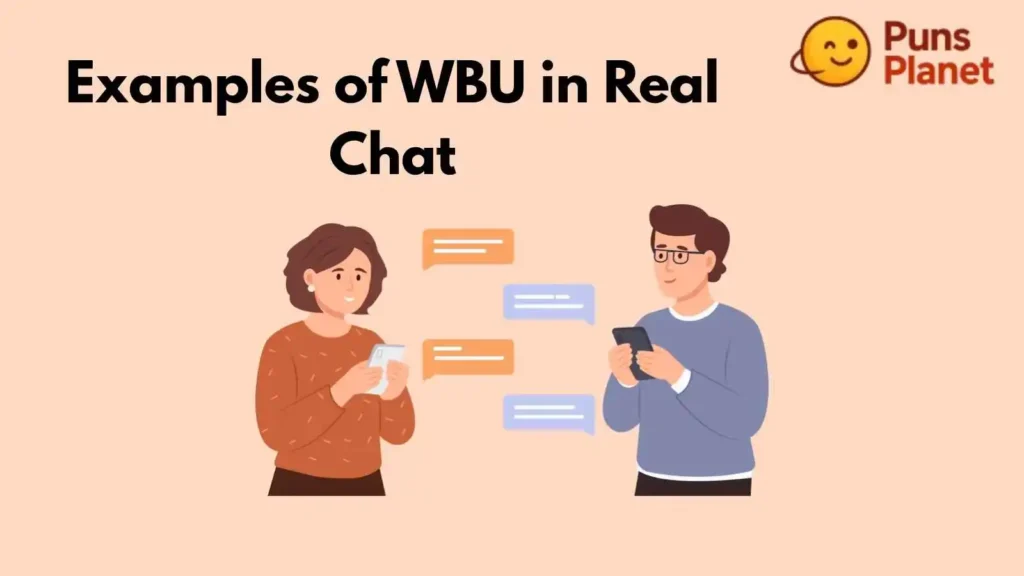
Let’s look at a variety of examples so you can see how versatile “WBU” is.
- You: “I just finished my exam—finally free! WBU?”
Friend: “Same here, I’m heading to the mall.” - You: “I prefer tea over coffee these days, WBU?”
Friend: “Coffee’s still my go‑to!” - You: “I’m going hiking this weekend. WBU?”
Friend: “I’ll probably chill at home.”
In each case, you’re showing your own situation and then using “WBU?” to invite their turn to speak. It keeps communication flowing and ensures it’s a two‑way exchange.
6. Variations & Similar Acronyms
“WBU” is one of many acronyms used to keep conversation light and friendly. Here are some similar ones:
- HBU → “How about you?” (very similar in meaning)
- And you? → Slightly more formal alternative.
- What about u? → Less acronymous, more conversational.
While you’ll see these variants, “WBU” remains a strong shorthand in casual chats.
7. When *Not* to Use “WBU”
Even though “WBU” is handy, it’s not always appropriate. Here are some situations to avoid it:
- Formal or professional emails: It may come across as too casual.
- When clarity is needed: If your audience might not know the acronym.
- When you’ve already asked a direct question: e.g., “What do you think?” then “WBU?” might seem redundant.
- When the conversation is about serious or sensitive topics: better use full sentences and clear phrasing.
In such contexts, using full phrases like “What do you think?” or “How about you?” allows you to maintain clarity, tone, and respect.
8. The Origin & Evolution of “WBU” 🕰️

Let’s take a quick look at how “WBU” came into being and why it became popular.
- The phrase “What about you?” has been part of spoken English for decades.
- Text and chat culture embraced shortened forms: “What ’bout you?”
- Then came the acronym “WBU” for speed, convenience, and style.
- It spread through SMS, instant messaging, social media — now it’s standard chat lingo.
Because texting often demands speed and ease, acronyms like WBU help keep things brief and informal while still meaningful.
9. Why “WBU” Matters in Communication
You might ask: “Is a little acronym really important?” The answer is yes—especially in the world of online communication. Here’s why “WBU” matters:
- Encourages two‑way conversation: By using WBU, you show you’re genuinely interested in the other person’s input.
- Builds rapport: Inviting others to speak fosters connection and engagement.
- Saves time: In fast chats, texting, and platforms, a short “WBU?” does the job well.
- Reflects modern language trends: Using current slang shows you’re tuned into contemporary digital culture.
In short: using WBU smartly demonstrates both awareness and friendliness. It helps you fit into chat culture while keeping the tone warm and inclusive. 😊
10. “WBU” Across Different Platforms
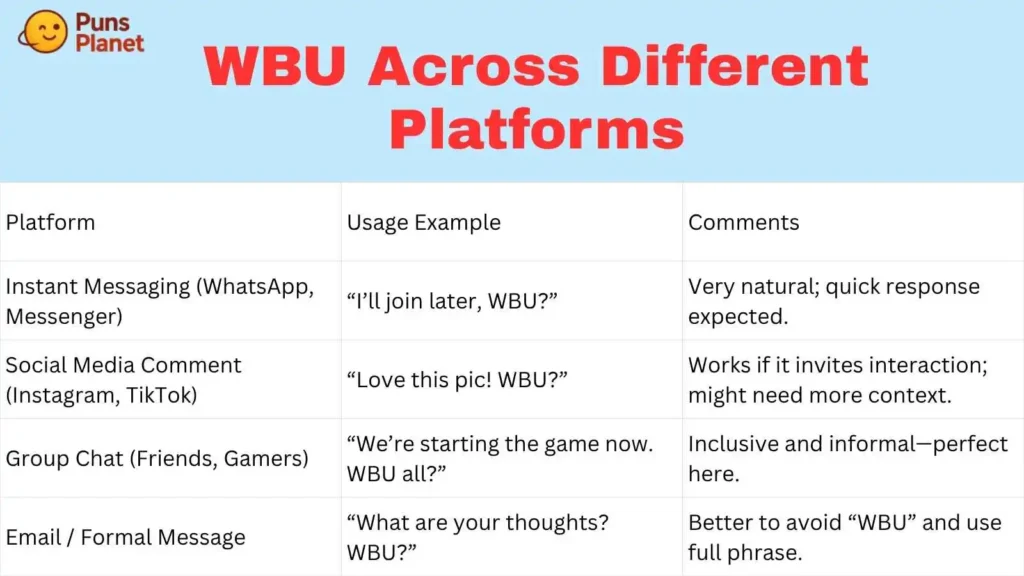
How does “WBU” behave across different digital spaces? Let’s compare:
| Platform | Usage Example | Comments |
|---|---|---|
| Instant Messaging (WhatsApp, Messenger) | “I’ll join later, WBU?” | Very natural; quick response expected. |
| Social Media Comment (Instagram, TikTok) | “Love this pic! WBU?” | Works if it invites interaction; might need more context. |
| Group Chat (Friends, Gamers) | “We’re starting the game now. WBU all?” | Inclusive and informal—perfect here. |
| Email / Formal Message | “What are your thoughts? WBU?” | Better to avoid “WBU” and use full phrase. |
So depending on the platform and audience, you may tweak your phrasing. In informal spaces, “WBU?” shines. In formal ones, opt for clarity.
11. Common Misunderstandings & Mistakes
Even though it’s simple, there are some pitfalls when using “WBU.” Let’s address a few:
- Using “WBU?” without context: If you jump in with “WBU?” out of the blue, it may confuse the reader because they don’t know what you’re referring to.
- Overusing it: If every line ends in “WBU?”, it may feel repetitive or forced. Alternate your phrasing for variety.
- Using in formal situations: As mentioned, if you’re emailing a manager, professor or in a business context—avoid the acronym.
- Assuming everyone knows it: Some users—especially older users or those less into chat slang—may not know “WBU”. In those cases consider using the full phrase at least once.
Fixing these mistakes will help your chat messages come across clearly and effectively.
12. Cultural & Generational Notes

Different generations and cultures may perceive chat acronyms like “WBU” differently. Here are some notes to keep in mind:
- Younger users: Often comfortable with acronyms like WBU, HBU, IDK, etc.
- Older users or professional settings: Might prefer full phrases and avoid slang.
- Global usage: In non‑native English contexts, “WBU” may still be used—but clarity matters.
If you’re chatting with someone from a diverse background or older age group, you might consider using “What about you?” instead of “WBU?” to ensure comprehension and tone‑sensitivity.
13. How to Respond When You See “WBU?”
If someone sends you “WBU?”, here’s how you can respond smoothly and keep the conversation going:
- Share your own info: “I’m doing great, thanks! Just finished a workout. WBU?”
- Ask a related question: “Good! I just started a new book. WBU—reading anything lately?”
- Keep it balanced: Respond and invite them in return: “I’m heading out for coffee. WBU—what are your plans?”
Using this pattern helps build engaging, two‑way chat instead of one person dominating the message thread.
14. Alternatives to “WBU?” When You Want to Mix It Up
Sometimes you might want to vary your language for flavor or context. Here are alternative ways to ask the same idea:
- “What about you?”
- “How about you?”
- “And you?”
- “What do you think?” (a little more formal)
Mixing your phrasing keeps your chat style fresh and shows that you’re thoughtful about how you communicate.
FAQs:
Q1: Is “WBU” appropriate in professional emails?
A1: No, it’s best used in casual chats. In a professional email use phrases like “What do you think?” instead.
Q2: Can “WBU” mean something else?
A2: In very rare cases, “WBU” appears as an acronym for organisations (like World Blind Union), but in texting it almost always means “What about you?”
Q3: How do I know when to use “WBU” vs “HBU”?
A3: They’re almost interchangeable. “WBU” stands for “What about you?” and “HBU” stands for “How about you?” Choose based on which sounds more natural in your sentence.
Q4: Should I always use a question mark after “WBU”?
A4: Yes. The question mark signals you’re asking for their response. Without it, “WBU” may seem incomplete or confusing.
Q5: Can I use “WBU” in spoken conversation?
A5: While possible among friends, it’s designed for text/online chats. In speech you might simply say, “What about you?”
Conclusion:
In the world of digital chatting, the bit‑size acronym WBU is a friendly, efficient way to invite someone’s thoughts or continuation of a conversation.
When you share something and then add “WBU?”, you’re signalling interest in their input—and that builds connection.
Use it in casual contexts, be mindful of your audience, and respond thoughtfully when someone uses it toward you. By doing so you’ll be chatting like a pro. 💬

